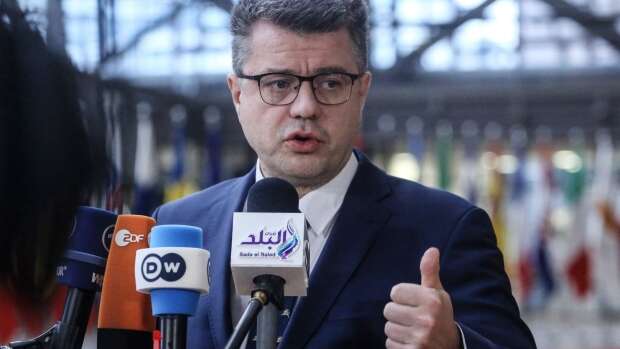The European Union should halve the $60 price cap on Russian oil this month and further squeeze Moscow’s ability to fund the war in Ukraine, Estonia’s foreign minister said, according to Bloomberg.
More than a year after the Kremlin launched its full-scale invasion of its neighbor, Estonia’s top diplomat said EU leaders should intensify sanctions on Russian banks and its nuclear power industry.
The bloc must also crack down on sanction-skirting methods that let President Vladimir Putin’s government access technology to fuel its war machine, Urmas Reinsalu said Saturday in an interview in the western Ukrainian city of Lviv.
“We have to put the Russian crude oil price cap so that it will not allow the Russia state to receive extra benefit,” said Reinsalu, whose country has emerged as one of the most ardent advocates for arming Ukraine to defend against Russia’s assault. Cutting the cap by half would “be the proper direction,” he said.
EU states have committed in principle to aim to keep the cap at 5% below average market prices. However, any changes to the threshold are set by the Group of Seven nations, who are due to meet later this month to discuss the matter.
The US and others have so far been reluctant to cut the cap over concerns it could lead to a spike in oil prices, so a cut of the magnitude suggested by Reinsalu is unlikely. And a decision to change the price cap needs the backing first of the G-7 and then unanimity among all EU member states.
Reinsalu said Russia’s banking and insurance systems were still able to operate in the international SWIFT transaction network, while the price cap on crude should be extended to natural gas.
“Of course, it is a consensus issue but we won’t give up in our appeal,” said Reinsalu.
His boss is Prime Minister Kaja Kallas. Her Reform Party, of which Reinsalu is not a member, scored a dominating election win on Sunday. One of Ukraine’s most strident supporters, she has pushed her allies to give Ukraine more weapons, arguing that the only way for the war to end is for Russia to lose on the battlefield.
The crackdown on sanctions avoidance — which trade data suggests is allowing Russia to receive EU-made chips and integrated circuits used in advanced weapons such as missiles and tanks via Turkey, the United Arab Emirates and Kazakhstan — needs both pressure on countries and a boost to the European Commission’s capacity to stop violations, Reinsalu said.
“We should continue friendly pressure on neighboring countries not to be involved,” Reinsalu said.
Estonia is also trying to create an EU precedent by confiscating the frozen assets of sanctioned Russians so they can be transfered to Ukraine for reconstruction, he added. Estonia has frozen around €20 million ($21 million) from private Russian companies, Reinsalu said.
“We would like to see an international solution, an EU solution” for the issue, Reinsalu said. “We would like to encourage countries to show by their own examples that it is possible, and this is the right thing to do.”


